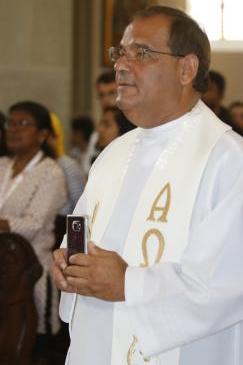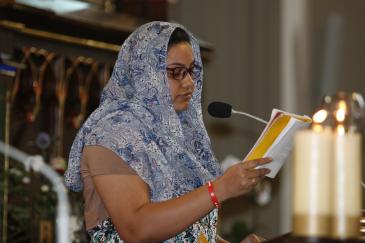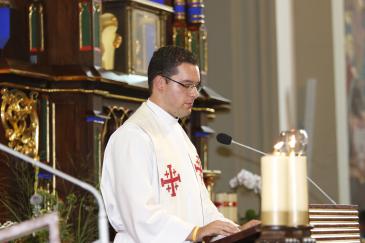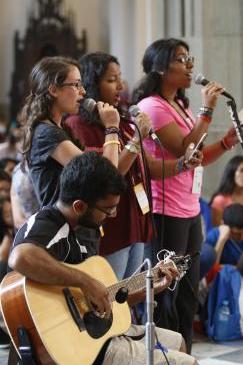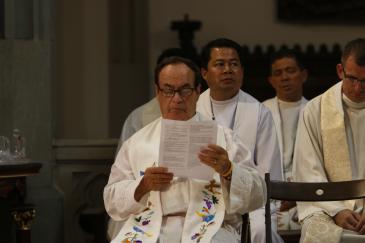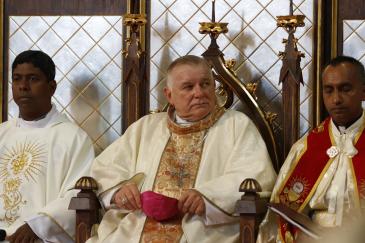By Archbishop Thomas Wenski - The Archdiocese of Miami
Photography: ANA RODRIGUEZ-SOTO | FC
Archbishop Thomas Wenski preached this homily after delivering his first catechesis to about 600 English-speaking youths at St. Joseph's Church in Krakow, Poland, as part of the World Youth Day events. Following the catechesis and a question and answer session, Archbishop Wenski celebrated Mass for the assembly. July 27, 2016.
In our contemporary societies, there is a war on women � but not the one described by the media that attempts to pit women against the Church and her teachings and the Church against women. It is hard to understand that given the high regard we hold for Mary that some would accuse us in the Church of waging a war on women � because we defend the life and the dignity of the unborn. The Church is not the enemy of women � and certainly history will show that the societies and cultures where the Gospel took root brought women more freedom, not less freedom.
It’s only when people begin to think of a woman’s fertility as a pathology, and pregnancy as a disease, it’s only then that the lie can be plausibly sold to the unsuspecting that the Church is at war with women.
Is there a war on women? Given that in more and more countries including in the US, abortion is being used for “sex selection” � female children are aborted because a male child is more highly favored � one could perhaps argue that there is a “war on women”; but it is certainly not being waged by the Church. The real war on women is being waged by the proponents of our contemporary Culture of Death � a culture that argues for the necessity of legal abortion so as to protect sexual freedom, that is, sex freed not only from consequences but from real meaning. Does allowing for the death of a child perceived as being “inconvenient” really promote women and their dignity � or doesn’t it just protect male privilege � and irresponsibility?
In the Gospel reading today, we also see a war, a “war” on a “woman,” the woman caught in adultery. It is the scribes and the Pharisees who have “declared” war on her � demanding that she be stoned. These men want to eliminate this woman to cover up their own complicity in her sin � for stoning was the required punishment for her but not for her accomplice. Her death would also serve to protect male privilege.
While Jesus does not legitimate the sin of adultery, he rejects the fury and impudence of the sinners who wanted to be judges of the sins of others. Jesus’ justice is a creative justice � a justice called mercy. In Jesus, we see revealed the image of a God who loves his people to the point that they can learn to be merciful too.
In the “war on a woman” that we find in the Gospel today, Jesus takes the side of the woman. He writes the sins of fragile humanity on sand; but his mercy is written in the heart of a woman thirsty for life. We are called to do likewise � and in our work to defend the lives of the unborn, we must at the same time show ourselves to be always on the side of the women, the women who are contemplating whether to have an abortion and the women who have had abortions � for in every abortion, there are at least two victims, the unborn baby and the mother.
Allow me to quote Saint John Paul II, who wrote in Evangelium Vitae the following:
“I would now like to say a special word to women who have had an abortion. The Church is aware of the many factors which may have influenced your decision, and she does not doubt that in many cases it was a painful and even shattering decision. The wound in your heart may not yet have healed. Certainly what happened was and remains terribly wrong. But do not give in to discouragement and do not lose hope. Try rather to understand what happened and face it honestly. If you have not already done so, give yourselves over with humility and trust to repentance. The Father of mercies is ready to give you his forgiveness and his peace in the sacrament of Reconciliation. To the same Father and his mercy you can with sure hope entrust your child. With the friendly and expert help and advice of other people, and as a result of your own painful experience, you can be among the most eloquent defenders of everyone's right to life. Through your commitment to life, whether by accepting the birth of other children or by welcoming and caring for those most in need of someone to be close to them, you will become promoters of a new way of looking at human life.”
St. John XXIII said at the beginning of the Second Vatican Council, "the Bride of Christ wishes to use the medicine of mercy rather than to take up arms of severity." In the face of so much turmoil in the world, in the face of partisan divisions everywhere, in the face of the crises that beleaguered our cities and the hurt and divisions in so many families, who could say that the world doesn't need this medicine more than ever? We must strive to make our parishes, our communities, our families "oases of mercy."
“Now is the time of mercy.” This is an invitation to each of us to give renewed emphasis to both the corporal and spiritual works of mercy. The corporal works of mercy are to feed the hungry, give drink to the thirsty, clothe the naked, welcome the stranger, heal the sick, visit the imprisoned, and bury the dead; the spiritual works of mercy are to counsel the doubtful, instruct the ignorant, admonish sinners, comfort the afflicted, forgive offenses, bear patiently those who do us ill and pray for the living and dead.
Whether we wear a clerical collar, a white collar or a blue collar, each of us despite all our obvious shortcomings has received a vocation, calling to witness to mercy � for the mercy of God is the heartbeat of the Gospel.
A favorite devotion of Pope Francis is to Our Lady representation by a painting called La Virgen Desatanudos � Mary the Undoer of Knots. May Mary help us to loosen the knots of human respect, bitterness or vice that we have tied ourselves up with and thus lead us to experience the mercy of the Lord Jesus, who in forgiving our trespasses tells us as he told the woman in today’s Gospel: Go, and sin no more.


